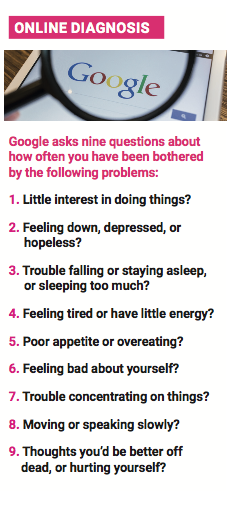
The tech giant is offering a free online questionnaire for Americans in the hope it creates a positive impact on the number of people seeking official diagnosis – UK may follow in 2018

Launched in August, American citizens googling for depression-related terms via their mobile now see a “knowledge graph”. Featuring an illustration, summary and a prompt to check if you are clinically depressed, users have the option to take a “PHQ-9 screening questionnaire”, as used by professionals. Results are then displayed alongside advice and links to the National Alliance on Mental Illness (NAMI) and National Suicide Prevention Line. If it becomes a success, Google will launch the programme in the UK.
Concerns have been raised about the tech giant’s hunger for data collection, but Google assures users that no individual data linking them to their answers will be used without their consent. Anonymised data, however, may be used in conjunction with other elements in order to improve their user experience.
CEO of NAMI, Mary Giliberti, highlighted the potential benefits to people experiencing clinical depression. “The PHQ-9 can be the first step to getting a proper diagnosis. Statistics show that those who have symptoms of depression experience an average of a six-to-eight-year delay in getting treatment,” said Giliberti. Through providing the questionnaire on the world’s largest search engine, NAMI hopes to enable quicker access to diagnosis and treatment. But with so many questionnaires already available online, can one more really help?

Apparently, yes.
In a 2015 study, people trusted high-ranking Google results. A recent experiment found that search engine results could also be used to manipulate people’s views on the safety of vaccines. By creating this “knowledge graph”, and then placing it in the number one spot after paid adverts, Google has created a scenario that should see a positive impact on the number of people seeking official diagnosis and treatment.

